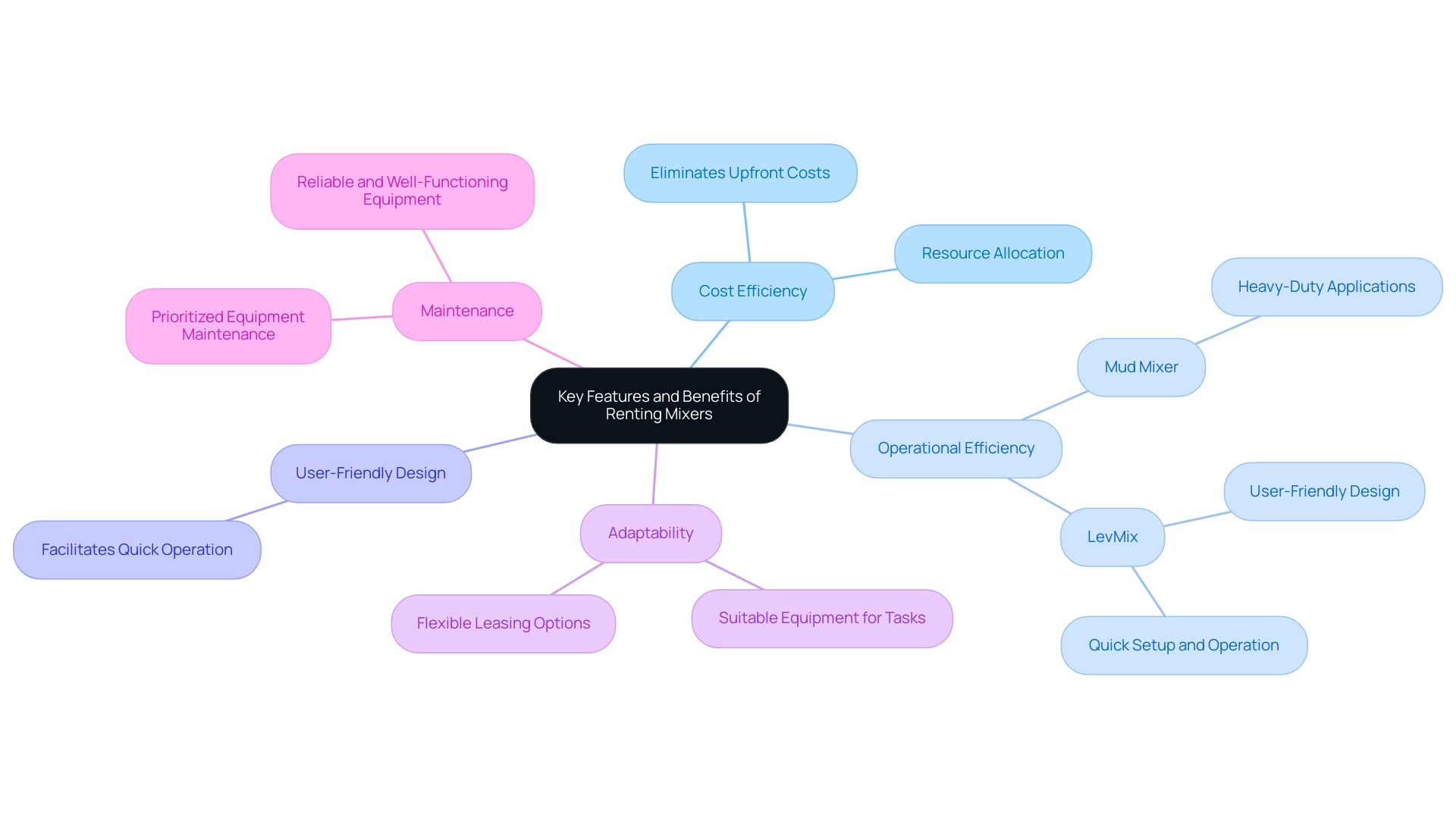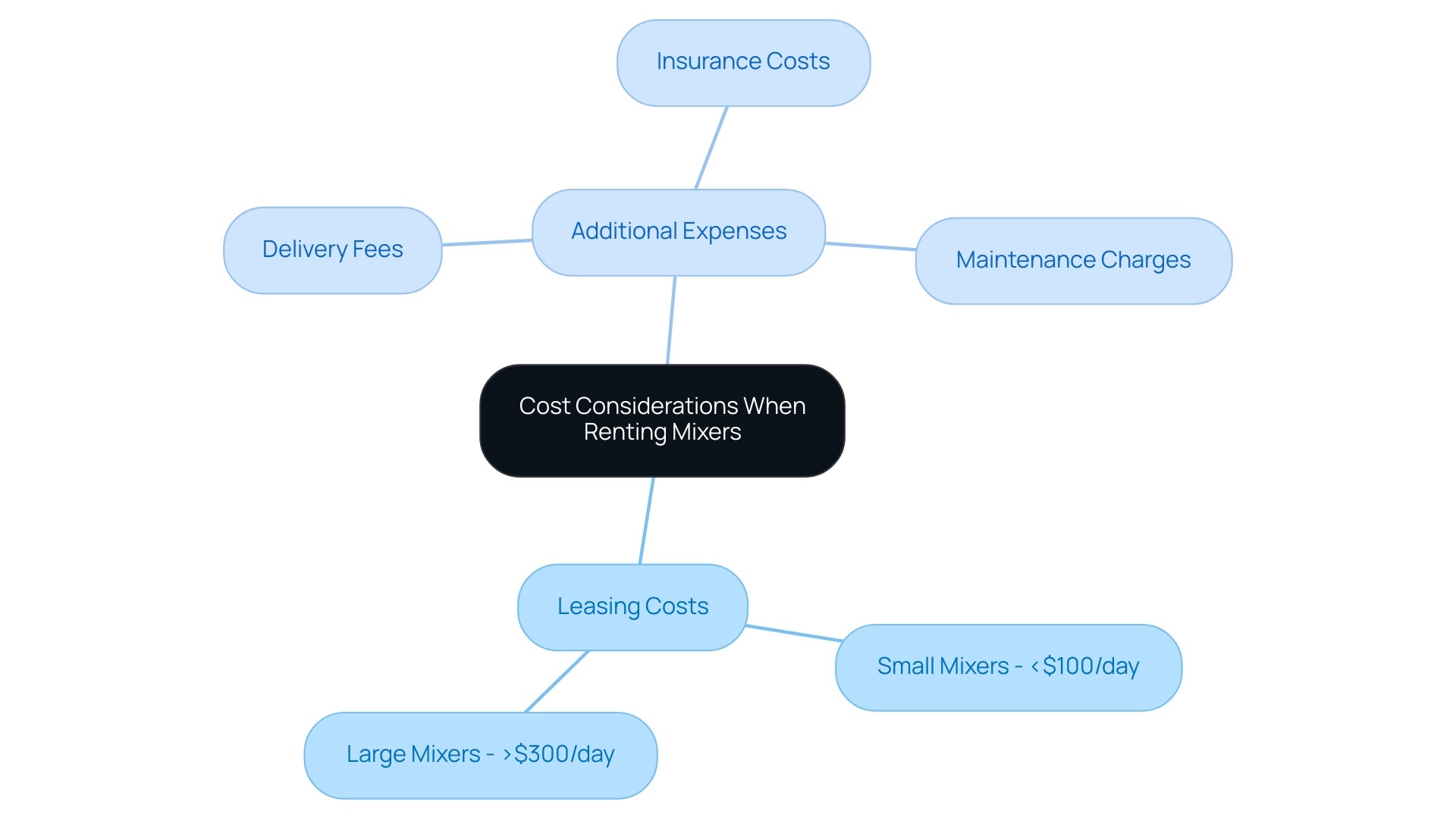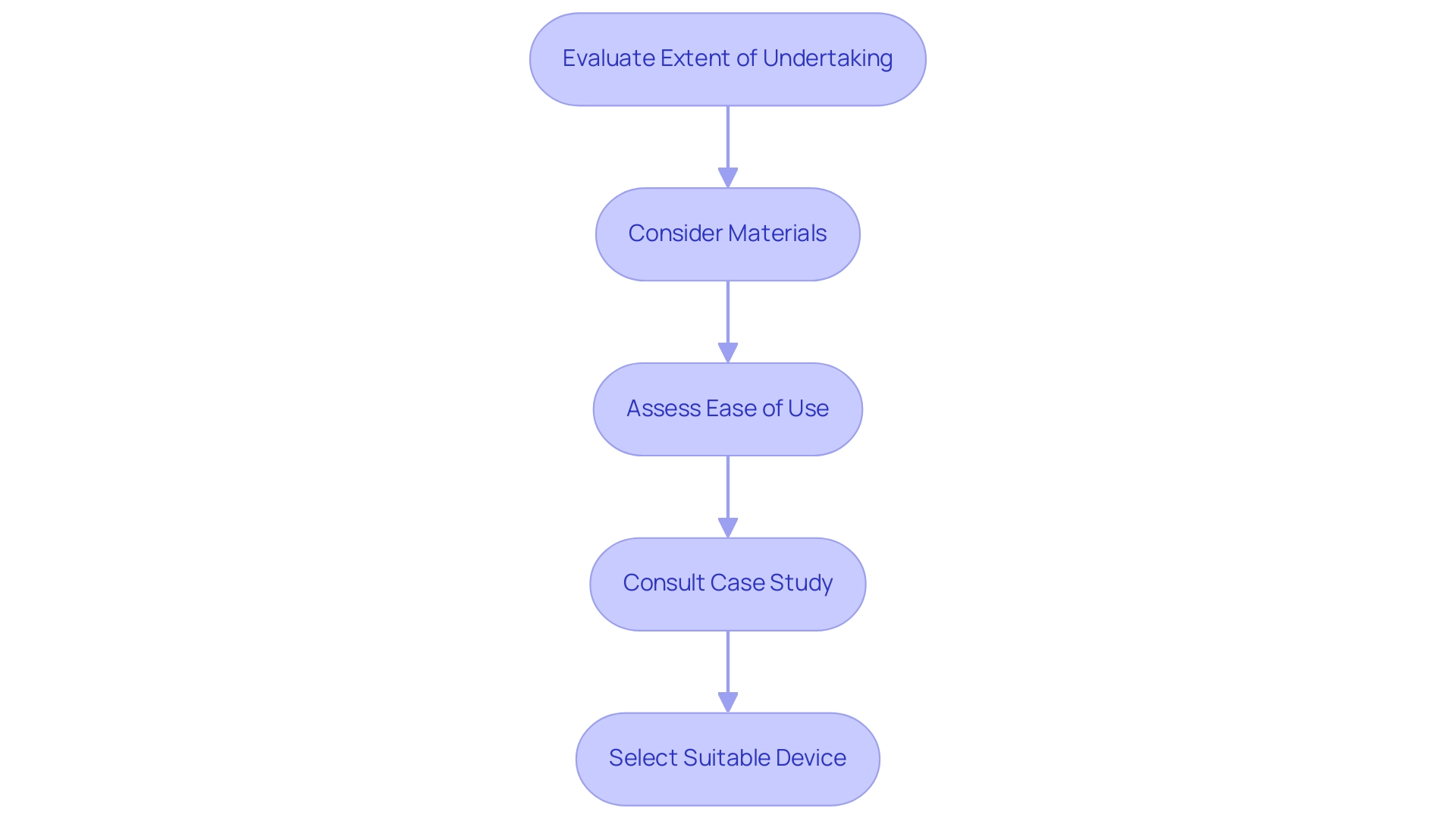Introduction
In the construction industry, the choice of equipment can significantly impact project efficiency and outcomes. As project managers navigate the complexities of timelines and budgets, understanding the various types of mixers available for rent becomes essential.
From cement mixers that facilitate on-site concrete mixing to specialized mud mixers designed for drywall applications, each option serves a distinct purpose tailored to specific project needs.
With the growing trend towards rental solutions, the advantages of renting—such as cost savings and access to well-maintained equipment—become increasingly appealing. However, the decision-making process requires careful consideration of factors like project scope, material types, and the overall rental experience.
This article delves into the nuances of mixer rentals, offering insights that empower construction professionals to make informed choices that align with their project goals.
Exploring Different Types of Mixers for Rent
When exploring rental options, you can find a mixer for rent among the various types of blending devices available, each tailored for distinct applications in the construction field. Cement machines play a pivotal role, as they enable the on-site blending of concrete, which is crucial for timely completion. These devices vary from compact, portable models suitable for smaller tasks to larger, truck-mounted versions intended for extensive undertakings.
Notably, the United States dominates the global cement rental market, holding a substantial 25.7% market share as of 2023, according to industry insights from Fact.MR. Furthermore, MudMixers present an excellent option for contractors needing to mix drywall mud or other viscous materials, ensuring a smooth and consistent application that meets assignment specifications. It’s essential to acknowledge that while cement and mud machines focus on building requirements, audio devices serve a different sector—primarily the entertainment industry—by allowing professionals to blend multiple audio inputs effortlessly.
Each type of device serves a distinct function, emphasizing the necessity for users to clearly determine their specific needs before making a choice regarding a mixer for rent. Furthermore, with leasing choices accessible within a 160 km radius of Groupe Bellemare's facilities, and adaptable leasing durations, package offers, and reductions for extended leases becoming more frequent, site managers can discover solutions that address their diverse requirements and budgets.
Key Features and Benefits of Renting Mixers
Renting a mixer for rent, particularly heavy-duty models, offers numerous benefits that are essential for managers handling tight budgets and demanding timelines. One of the primary benefits is cost efficiency; renting a mixer for rent eliminates the significant upfront costs associated with purchasing equipment, allowing firms to allocate resources more effectively. In fact, leasing firms dominate the UK construction equipment market with a 68% share, underscoring the growing trend towards leasing solutions.
For instance, models like the Mud Mixer are designed specifically for heavy-duty applications, providing exceptional mixing capabilities that can simplify processes and improve overall efficiency. Similarly, the LevMix stands out for its user-friendly design, facilitating quick setup and operation—an essential feature for both novice and seasoned operators. As Karen Lopez noted, 'rental platforms like Sharefox have completely digitized the process of managing inventory, keeping track of orders, showing equipment availability, and preventing overbooking,' which highlights the modern advantages of renting.
This adaptability in leasing choices allows managers to choose the most suitable equipment for each distinct task, ensuring optimal performance without incurring unnecessary expenses. Additionally, leasing companies prioritize equipment maintenance, ensuring that customers have access to reliable and well-functioning mixer for rent. This attention to service quality further enhances the appeal of renting, as it allows teams to focus on task execution rather than equipment management.
Recent case studies suggest that major participants in the leasing sector are concentrating on adaptable leasing options, which corresponds with the industry's movement towards digital solutions and consolidation, illustrating the growing significance of leasing services in building endeavors.

Cost Considerations When Renting Mixers
When analyzing the financial effects of leasing equipment, construction project managers must closely assess both the leasing costs and any additional expenses that could occur. The expenses linked to leasing a mixer for rent can differ significantly based on the kind and dimensions of the device, along with the duration of the lease. For instance, smaller concrete machines usually have fees of under $100 per day, while larger versions can surpass $300 daily.
Considering that Kaltenbach averages approximately 3.25 days of work each week, understanding how frequently a mixer for rent may be needed can greatly impact leasing choices. Moreover, it is essential to consider possible extra expenses, including:
- Delivery fees that may be applied for transporting the equipment
- Insurance costs to safeguard against damages
- Maintenance charges for upkeep during the leasing period
As one specialist remarked, 'Many thanks' for taking all expenses into account in these agreements.
By understanding these financial factors upfront, managers can create a more accurate budget and avoid unexpected expenses. This approach mirrors the strategies outlined in the case study 'Negotiating Better Terms with Long-term IT Vendors,' where effective negotiation can lead to improved terms. Consequently, making a mixer for rent a viable and economical choice for short-term building endeavors.

Choosing the Right Mixer for Your Project
Selecting the suitable device for your building endeavor necessitates a comprehensive assessment of various essential elements. Begin by evaluating the extent of your undertaking; for example, larger construction sites—commercial post and beam frames can reach heights of 60 or 70 feet—may require sturdy, heavy-duty cement machines, while smaller tasks can effectively use portable versions. Next, consider the materials involved in your mixing process; if you are working with materials like drywall mud, opting for a specialized Mud Mixer will enhance your efficiency due to its tailored design.
Additionally, take into account the ease of use; modern mixers often feature adjustable speeds and automatic mixing capabilities, which can significantly save time and lower labor costs. As David J. Byrd, National Director of the U.S. Department of Commerce’s Minority Business Development Agency, emphasizes, understanding the specific requirements of your endeavor is crucial in selecting the right equipment. Furthermore, the case study titled 'Site Equipment: How to Determine Your Requirements' provides valuable guidance on assessing equipment needs based on site conditions and budget.
By carefully assessing these elements, you can choose a device that not only fits your needs but also enhances overall efficiency, ensuring durability and effectiveness in your efforts.

Rental Process and Considerations
The mixer leasing process is a critical phase for construction project managers seeking efficiency and reliability. It typically begins with thorough research to identify reputable leasing companies within your area. Once you have shortlisted potential providers, the next step involves inquiring about equipment availability, leasing terms, and any associated fees.
It's essential to inspect the equipment meticulously for signs of wear or damage, as these factors can significantly impact performance. Specialists in the area highlight that evaluating the state of leased equipment is essential to prevent expensive delays in your undertaking. Additionally, consider discussing delivery and pickup options, as many companies offer these services, albeit often for an extra fee.
Before finalizing your agreement, familiarize yourself with the lease contract to fully understand your responsibilities, including maintenance and the conditions for returning the equipment. Adopting these best practices not only ensures a seamless leasing experience but also secures the right mixer for your project's specific needs. As Kyle Clements, the Founder & CEO of Quipli, observes, understanding the equipment leasing market's dynamics is essential for making informed decisions that enhance operational efficiency.
With the U.S. equipment leasing market projected to grow to an estimated 59.5 billion U.S. dollars by 2024, it is more important than ever to make informed choices. Moreover, understanding the total cost of ownership (TCO) and return on investment (ROI) for assets can ensure that financial strategies are effective. Implementing rental software with advanced analytics can provide insights into asset performance and utilization rates, which in turn helps improve financial planning and budgeting.
Conclusion
Understanding the nuances of mixer rentals is essential for construction project managers aiming to enhance project efficiency and control costs. The article highlights the variety of mixers available, from cement mixers crucial for concrete mixing to specialized mud mixers tailored for drywall applications. Each type serves a specific purpose, making it imperative for professionals to assess their project requirements before making a rental decision.
Moreover, the benefits of renting mixers are considerable. Cost efficiency stands out, allowing project managers to allocate resources effectively without the burden of high upfront costs. The flexibility and reliability of rental options ensure that teams have access to well-maintained equipment that can streamline operations and improve overall project outcomes. Additionally, understanding the financial implications, including potential additional costs, can lead to better budgeting and avoid unexpected expenses.
Ultimately, selecting the right mixer involves a careful evaluation of project scope, materials, and user-friendliness. By following a structured rental process and considering all relevant factors, construction professionals can secure the appropriate equipment that aligns with their goals. Embracing rental solutions not only addresses immediate equipment needs but also contributes to the long-term success of construction projects, fostering a more efficient and cost-effective approach to the ever-evolving demands of the industry.
Frequently Asked Questions
What types of mixers can be rented for construction purposes?
Various types of mixers are available for rent, including cement machines for on-site blending of concrete and MudMixers for mixing drywall mud or other viscous materials. These devices range from compact, portable models for smaller tasks to larger, truck-mounted versions for extensive projects.
What is the significance of the cement rental market in the United States?
The United States holds a substantial 25.7% share of the global cement rental market as of 2023, highlighting its dominance in this sector.
How do MudMixers benefit contractors?
MudMixers provide an excellent option for contractors needing to mix drywall mud or similar materials, ensuring a smooth and consistent application that meets project specifications.
What should users consider before renting a mixer?
Users should clearly determine their specific needs based on the type of project they are undertaking, as each type of mixer serves a distinct function.
What are the advantages of renting a mixer instead of purchasing one?
Renting a mixer offers cost efficiency by eliminating significant upfront costs associated with purchasing equipment, allowing firms to allocate resources more effectively. Additionally, renting provides access to well-maintained equipment without the burden of ownership.
What features do heavy-duty mixers like the Mud Mixer and LevMix offer?
The Mud Mixer is designed for heavy-duty applications with exceptional mixing capabilities, while the LevMix features a user-friendly design for quick setup and operation, making it suitable for both novice and experienced operators.
How has technology impacted the rental process for mixers?
Rental platforms like Sharefox have digitized inventory management, order tracking, equipment availability, and booking prevention, enhancing the efficiency of the rental process.
What are the benefits of adaptable leasing options in the construction industry?
Adaptable leasing options allow managers to select the most suitable equipment for specific tasks, ensuring optimal performance without incurring unnecessary expenses. This flexibility is increasingly prioritized by leasing companies.
How do leasing companies ensure the quality of rented mixers?
Leasing companies focus on equipment maintenance to ensure that customers have access to reliable and well-functioning mixers, allowing teams to concentrate on task execution rather than equipment management.




